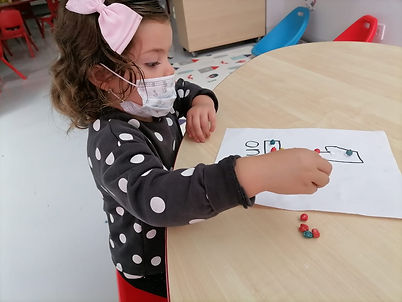
Our Parents Guide
MC Mighty Families Blog
At Mainer Canadian we know that behind every Mighty Learner there's a mighty family, caring for and supporting from home. At Mainer Canadian we empower our parents with practical knowledge and skills to support their child's development.
Here on the blog you'll find tips, tricks and info to empower you as a parent.


The importance of
Dizzy Play
"Children love to twirl until they are too dizzy
to stand up, laugh with others over nothing in
particular, babble nonsense words in a riotous
conversation, put their pants on their head or
their jacket on their legs, and perform for
their friends. They revel in their power to turn the
world upside down, playfully confident that they
can restore it."
-Flight: Alberta's Early Learning and Care Framework
You've probably never heard of "dizzy play". I certainly hadn't until I read Alberta's full manifesto on early learning. Dizzy play is essentially the epitome of childhood. It's messy, loud and expressive.
Flight defines dizzy play as, "a relatively new term used to describe the important learning and development that happens for children when they create disorder and reorder within playful experiences. Elements of dizzy play are present in experiences such as rough and tumble play, full body exploration, and humour and language play."
This kind of play is exhilarating for children - and adults too when we allow ourselves the opportunity. However, as the caretakers and educators in a child's life it can be hard to tolerate. Allowing children the experience of being "in charge" of their world for a moment, to create chaos and then order it their way, to release energy, to provoke change, to giggle uncontrollably, all require a release on the part of the adult.
This kind of play not only provides a healthy release for kids on both an emotional and physical level but also brings great joy their their life.
At Mount View we challenge our educators to allow for dizzy play at school. It may be loud and messy, but so is childhood and we want our students to live their childhood to the max.
Here's a few questions from the Flight framework to process your own views on dizzy play as a parent:
"How do you value and respond to rowdy, physical
dizzy play?
What is your comfort level and how
does this affect the allowances you make for this
type of play?
Think about times when children’s joy
has been infectious, for example, sliding down hills,
dancing barefoot, or singing at the top of their lungs."
Special thanks to the folks up in Alberta who are challenging educators and parents everywhere to rethink the early years!
This is a Paragraph. Click on "Edit Text" or double click on the text box to start editing the content and make sure to add any relevant details or information that you want to share with your visitors.
Fine motor skills
Developing
Vision
What are fine motor skills? Its all the activities that involve the use of small muscles that control the the hand, fingers and thumbs.
Developing fine motor skills help children perform important tasks such as feeding themselves, grabbing objects such as pencils, scissors and finally, writing.
Having this ability accomplishes self-care and helps a child’s self-esteem and confidence grow.
Many preschools push children to write too soon. Instead of focusing on the child's development the focus is on academic performance.
The problem is when the focus is academics we miss the developmental base needed for high performance academically. When pushed to write too soon children don't develop adequate hand strength and coordination which leads to incorrect pencil grip, pain when writing, frustration and resistance to school activities.
At Mainer Canadian we believe that focusing first on a child's development is what leads to high academic performance. That's why our classes are play-based, providing children with the opportunities to develop their whole person.
Activities that MC use to help motor skills development:
-Playing with playdoh and clay
-Cutting material of all different textures
-Manipulating small objects like beads and peas


Podcast: ¿Estás criando un hijo chiqueado?
By Haley and Walt Clay
Hay ocasiones en las que los papás hacen cosas de más para sus hijos y no dejan que ellos
hagan cosas por sí solos. Esto trae como consecuencia un comportamiento de un hijo
chiqueado y con falta de
autonomía.
Al quitarles la posibilidad de que desarrollen la habilidad dehacer las cosas por ellos mismos los estamos chiqueando y esto los perjudica ya que
les robamos pequeñas victorias.
Nuestra labor como padres es el acompañamiento y guía a
los hijos.
